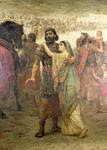Blessings
A couple of months ago, Richard posted a blog on the difficulty of using ‘the Grace’, or other spoken-together but unwritten words which are familiar to the congregation, but not to the visitor.
He went on to speak about the helpfulness of using a Benediction, or Blessing, spoken from the front. He mentioned biblical benedictions: the end of Jude, Ephesians 3, 2 Thessalonians. And in a later blog he included this benediction from Brian McLaren:
‘May the Spirit of Christ empower you to love and serve your neighbours, welcoming them into your lives and homes and schedules and hearts, so that through belonging they may discover the joys of believing and becoming. You are more ready for this than you realize. Go in God’s grace and peace!’
Benedictions are important to me. There is something about a benediction or blessing which marks not just the end of the service but a moment of deep significance as ‘the service ends and the worship begins’. For me the benediction is one of those special moments in a service.
From my experience of conducting the inductions of new ministers, although the service is led by others, normally the newly inducted minister concludes the occasion by pronouncing a blessing – it’s his or her first action as the minister of that church.
When we say a blessing we speak good and holy words over people. And there’s something about that which is powerful. We have the privilege of saying words through which we expect God, whose business is blessing, to do something, admittedly something mysterious and intangible, but something all the same. And so we become a part of the action of God, and through words spoken release God’s grace into people’s lives.
I collect benedictions, not in the obsessive way that I do other things. But I do sort of pick them up. I particularly like the Northumbria Community blessing, ‘May the peace of the Lord Christ go with you …’ And there are some gems from the Iona Community. But unoriginally, my favourite benediction remains Numbers 6, made more special because of the use at ordinations and inductions and other significant occasions where they don’t necessarily come at the end of a service, but can mark a moment of special grace within the service.
The LORD bless you and keep you; the LORD make his face to shine upon you, and be gracious to you; the LORD lift up his countenance upon you and give you peace.


Comments